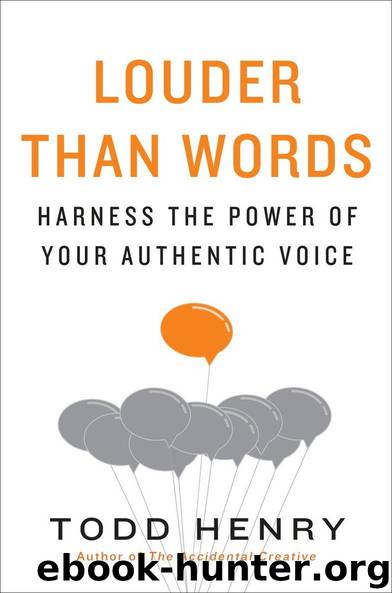Louder than Words: Harness the Power of Your Authentic Voice by Todd Henry

Author:Todd Henry
Language: eng
Format: mobi, epub
Publisher: Penguin Publishing Group
Published: 2015-08-10T22:00:00+00:00
What outcome (impact) am I trying to achieve for them?
What expectations will they have of me when they experience this work, and how can I meet and surpass them?
How might I surprise and delight them by overdelivering in unexpected ways?
As counterintuitive as it seems, you are better off with a small, highly targeted audience of raving fans than a larger audience that is lukewarm to your work.
IMPACT BEGINS WITH EMPATHY
As a child of the 1980s, my after-school hours were often filled with sitcoms and syndicated reruns of the popular television programs of the previous decades. Most of these shows had catchy theme songs, some of which—much to my chagrin—I can still sing word for word to this day. A few of the most catchy theme songs were for shows created by legendary television icon Sherwood Schwartz. For example, the entire context for his show Gilligan’s Island, which is about a group of unlikely shipmates who encounter a storm during their three-hour tour and wind up stranded on a deserted island, is painted in the opening theme. Another of Schwartz’s shows, The Brady Bunch, begins with a ditty that explains how an unlikely group became a family, and sets the audience up for what they’re about to see.
While he was often ridiculed for the overly explanatory theme songs, Schwartz had a very specific reason for why he chose them. He was once asked why he felt the need to explain the entire backstory for his shows in the intro to every episode.
His reply? “Confused people don’t laugh.”
Schwartz understood that if new viewers lacked context for the show, then they were unlikely to get as much enjoyment from it, and were therefore much less likely to become regular viewers. By bringing everyone up to speed with each episode, he was able to ensure that no one felt like an “outsider,” and thus create an inviting viewing experience.
These same principles apply regardless of the kind of work you do. It’s important to provide context for others, and to help them understand the flow of the story so that they can more easily assimilate new information. We understand new stimuli in our environment by comparing it to past experiences and determining how it fits the existing patterns and mental constructs we hold about the world and how it functions. If you are diligent about helping people understand the context for your work, then you are requiring less effort on their part to understand and apply it.
The first step in your ability to provide context is empathy. It’s not the responsibility of your intended audience to adapt to you, it’s your responsibility to adapt your idea so they can receive it.
The word communicate is derived from the Latin word communis, which means “common.” The roots of the word imply that it’s about making something common through sharing it with others. This is contrary to how we often think of communication today. In an age in which everyone has a platform, to communicate often means to blast a message out to the masses.
Download
Louder than Words: Harness the Power of Your Authentic Voice by Todd Henry.epub
This site does not store any files on its server. We only index and link to content provided by other sites. Please contact the content providers to delete copyright contents if any and email us, we'll remove relevant links or contents immediately.
| Bookkeeping | Business Mathematics |
| Business Writing | Communications |
| Decision Making | Negotiating |
| Project Management | Running Meetings & Presentations |
| Secretarial Aids & Training | Time Management |
| Training |
Nudge - Improving Decisions about Health, Wealth, and Happiness by Thaler Sunstein(7680)
Deep Work by Cal Newport(7042)
Principles: Life and Work by Ray Dalio(6388)
The Doodle Revolution by Sunni Brown(4730)
Factfulness: Ten Reasons We're Wrong About the World – and Why Things Are Better Than You Think by Hans Rosling(4724)
Eat That Frog! by Brian Tracy(4500)
Thinking in Bets by Annie Duke(4206)
Hyperfocus by Chris Bailey(4101)
Visual Intelligence by Amy E. Herman(3768)
Writing Your Dissertation in Fifteen Minutes a Day by Joan Bolker(3709)
Ogilvy on Advertising by David Ogilvy(3584)
Hidden Persuasion: 33 psychological influence techniques in advertising by Marc Andrews & Matthijs van Leeuwen & Rick van Baaren(3536)
How to Win Friends and Influence People in the Digital Age by Dale Carnegie & Associates(3535)
How to win friends and influence people by Dale Carnegie(3460)
The Pixar Touch by David A. Price(3420)
Schaum's Quick Guide to Writing Great Short Stories by Margaret Lucke(3363)
Deep Work: Rules for Focused Success in a Distracted World by Cal Newport(3216)
Work Clean by Dan Charnas(3103)
The Slow Fix: Solve Problems, Work Smarter, and Live Better In a World Addicted to Speed by Carl Honore(2990)
